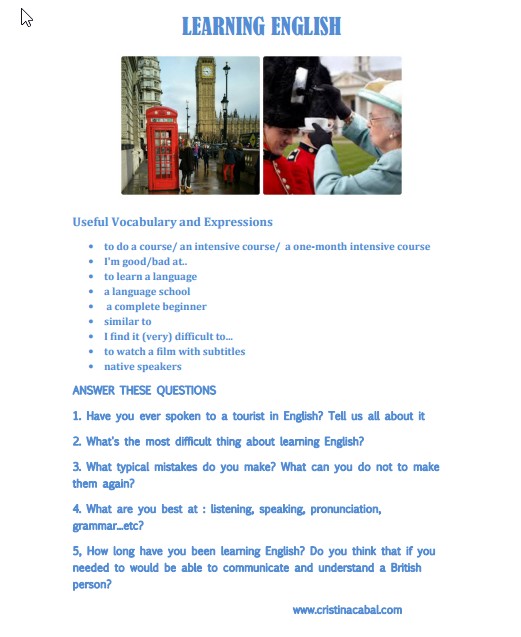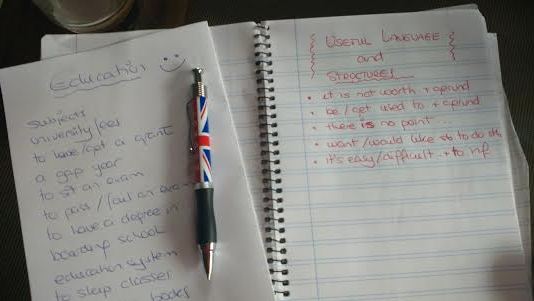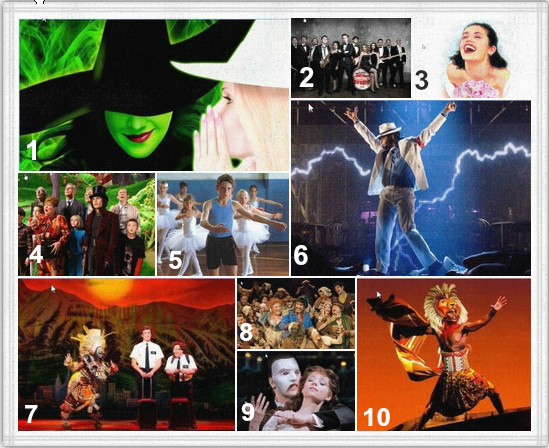The Speaking Test is knocking on your door? I have added two more Speaking+Vocabulary Speaking Lessons to the ever-growing list of Discussion Topics( check them out here); this time about Learning English. I hope they’re useful!

The Speaking Test is knocking on your door? I have added two more Speaking+Vocabulary Speaking Lessons to the ever-growing list of Discussion Topics( check them out here); this time about Learning English. I hope they’re useful!

Yes, it’s this time of the year. My students’ second term has already finished. Time to start a new one. The last one. It’s when every single year, I have serious doubts about whether I should be doing something else to help them improve. It’s like the yin and yang. The selfish side of my brain tells me I am giving them my best, staying up late preparing classes, creating new material students seem to swallow in 5 minutes …etc- and here 🙂 I cannot but remember my grandmother when she complained about how quickly we ate everything it took her all morning to cook- ; while the other side of me keeps reminding me of all the times I had to rush through a specific point or how on a particular day we didn’t have time enough to discuss a given issue in detail…etc.
But the truth is that although I should say that I honestly think I am doing my part, sadly the truth is that some students, unfortunately more than I wish, don’t seem to be able to understand that
Studying+Practising= Improving
The main difficulty my students need to overcome is their insecurities. They feel safe using a limited number of structures and they are afraid to use the new ones. New structures, new vocabulary is like a challenge to them and it is my intention to help them rise to this challenge; so this is what I’ll be trying next time we focus on Speaking.
1. FIXED PAGE
I am going to ask my students to write at the back of their notebooks some structures we have learnt this year; structures they instinctively know would show they have acquired the necessary level, like for example:
• It is not worth+gerund
• Get/be used to +gerund
• There is no point ….
• Want/ would like someone to do something
• It’s easy/difficult /nice + to infinitive
Students should be aware that this is their own personal list, to which they will be adding new structures or expressions they want to use as we move on towards the end of the course.

2. MOVABLE PAGE.
Most of the activities we do in class are topic centred, so we talk food, health or technology. Lessons in textbooks are also normally topic – based, and they provide students with the necessary vocabulary, phrasal verbs, readings …etc.
Before we start speaking about a given topic I am going to ask them to write on separate piece of paper all the vocabulary, expressions, idioms they can remember related to the topic. This should take like about two minutes and will give them an idea of how much they already know and how much they still need to study and then I am going to ask them to compare it with their partners to give them the opportunity to add any new ones they might have forgotten.
FIXED +MOVABLE PAGES. Once the speaking task is set, students will need to try to use as much vocabulary written on their movable page and as many expressions as they have at the back of their books. My experience is that most students tend to rush and just speak without caring about the structures or vocabulary they use, so I’m pretty sure that if I want this experiment to be successful I’ll need to use lot of persuasion and monitoring, but I think it’s worth a try. What do you think?
This is a lesson for Intermediate students (B1).
Hopefully, at the end of this lesson you’ll have learnt useful vocabulary to talk about a city/town/ village you like, you’ll be able to talk about the advantages and disadvantages of living in the city or the countryside and you’ll be able to understand people talking about it.
What’s your hometown like?
These are some common questions in oral exams. Before reading any further, think about how you coud best answer these questions. Try really hard. Imagine you’re taking the real test.
Ok! Now!!! Do you have all the words you need or, are there things you couldn’t say because you didn’t have the right words? If this is the case, then go on reading, this post is for you.
Below you’ll find some ideas to help you get started.
Mapa Mental creado con ExamTime por cristina.cabal
Now, watch these two short videos and answer the questions below. The first one is about the advantages and disadvantages of living in a big city and the second about the advantages and disadvantages of living in a small town ( could also be applied to living in the countryside)
Video 1. Advantages and disadvantages of living in a big city
Speaker 1. What’s the disadvantage he mentions?
Speaker 2. What are the disadvantages he mentions?
Speaker 3. What is, in his opinion, the main advantage? What two disadvantages does he mention?
Speaker 4. What’s the huge advantage cities have compared to rural areas?
Speaker 5. What’s, according to this speaker, the main advantage?
Video 2. Advantages and disadvantages of living in a small town (could be applied to the countryside)
Speaker 1. What’s the advantage and the disadvantage he mentions?
Speaker 2. What does he say about the pace of life in small towns?
Speaker 3. What’s the advantage and the disadvantage he mentions?
Speaker 4. For him, what’s the advantage and the disadvantage of living in a small town?
Speaker 5. What does he say happens in small towns?
♥By the way, do you know the difference between a city and a town???
A city is larger than a town and it has a cathedral 🙂 , at least in the UK
Now, do you think you can describe your hometown? Can you talk about your favourite city? Can you talk about the advantages and disadvantages of living in a city or in the countryside? Hope you can!
Who doesn’t like music? Today I am inviting you to take a glimpse at the Top Ten Musicals in London. Tough job to choose one ! A video-based lesson you’ll positively enjoy!
Level: B1/B2
Skills :listening, writing and vocabulary
Step 1. WARM UP. In pairs, talk about the questions below
♥How important is music in your life?
♥Have you ever been to a musical show? Why(not)?
♥Do you know any famous musicals?
♥There are lots of things to do in London, would you consider going to a musical?
Step 2. Look at the following collage containing pictures of different musicals. In pairs, can you identify any?

Get feedback. Most possibly students won’t be able to come up with the names for all the musicals. If this is the case, show them the options below.
A. The Lion King
B. The Phantom of the Opera
C. Wicked
D. Mamma Mia
E. Thriller
F. Billy Elliot
G. Les Miserables
H. The Book of Mormon
I. The Commitments
J. Charlie and the Chocolate Factory
Step 3. Play the video for the first time without giving students any task.After watching it , ask them whether they would fancy watching any of these musicals. Students watch the video a second time and fill in the gaps in the exercise below
Number 10. Charlie and the Chocolate Factory. Grab your won golden ticket and step inside the ____ (1) and wonderful Wonka Chocolate factory
Number 9. The Commitments.Originally a novel, then a hit movie, this musical is jam ____ (2) with classic soul hits
Number 8. The Book of Mormon.From the ____ (3)of South Park, this outrageously funny musical is not for the faint -hearted
Number 7. Les Miserables.An epic tale of broken dreams, passion, ____ (4) and redemption
Number 6. Billy Elliot.The ____ (5) story of a boy’s struggle against the odds to become a ballet star
Number 5. Thriller Live.The spectacular show takes you on an electrifying journey through Michael Jackson’s musical ____ (6).
Number 4.Mamma Mia. Abba’s timeless songs create the ultimate feel-good tale of love , laughter and ____ (7)
Number 3. Wicked.The untold story of the witches of Oz has won 90 international awards and is loved by ____ (8) and critics.
Number 2.The Phantom of the Opera.Andrew Lloyd Webber’s musical ____ (9) continues to captivate audiences
Number 1. The Lion King.Set in the Serengeti, this epic show explodes with glorious colours, stunning effects and ____ (10) music
Step 4. Vocabulary. Find a synonym for the following words in the video
-ageless
-impressive
-strange
-fight
-located
-prize
-full
Step 5. Writing . You’ve been asked to create a poster to advertise your high school end-of-the-term musical.Use postermywall.com to create the poster and think of something to say about the musical to attract an audience . Use some of the adjective+noun combinatios below
Can you tell the difference between farther and further or especially and specially? Do you know for certain when to use arrive in or arrive at? Which one is American English at the weekend or on the weekend, math or maths? Is it think of, about, in or on?? Do you have problems using and/or pronouncing weigh, weighed and weight? You are pretty certain you know how to use boring and bored, but does it work the same for stressed and stressing? If these questions have raised serious doubts, then this post is for you. 🙂
Click on the picture if you want to go straight to the section
I sometimes have to remind my students I’m not a walking dictionary !! I honestly believe what makes a good teacher is not how many words he knows in the dictionary or whether he knows a given idiomatic expression. I don’t think knowing what “stuck in a rut” means makes you a good or a bad teacher. I firmly believe a good teacher is the one who loves his work and is able to transmit his love for what he does to his students and is able to keep them motivated whenever they want to give up. I have learned that being a good teacher is not teaching to those who want but to those who don’t.
Although initially English is not such a difficult language to learn, it cannot be argued that for some students it is easier than for others. Take for example , a native speaker of Dutch or German and a native speaker of Japanese or Russian. Obviously, German and Russian are closely related to English whereas Japanese or Russian are completely unrelated so I’m sure you can draw your own conclusions in this matter.
Very often students tend to systematically makes mistakes with a given word either in its pronunciation or in the way it collocates with certain prepositions, adjectives …etc and we cannot forget here the issue of false friends which causes so many problems and, trust me, sometimes funny misunderstandings, like in Spanish, the false friend “embarrassed ” and “pregnant”.
To help my students and readers of this blog overcome these difficulties, I have created a new section in this bog called CONFUSING WORDS. I hope it’s helpful!